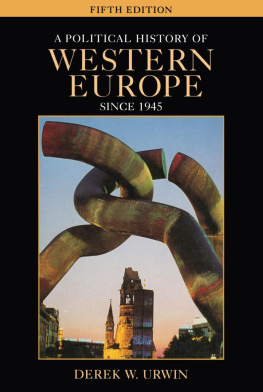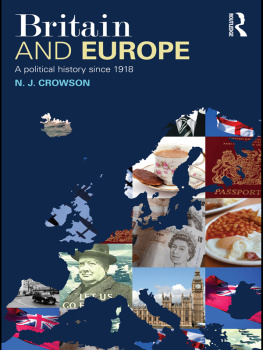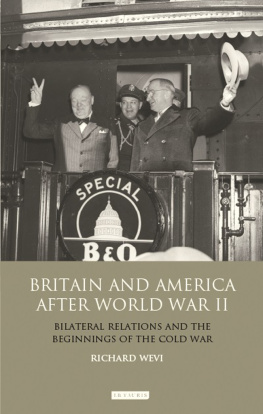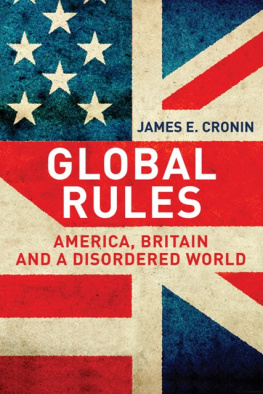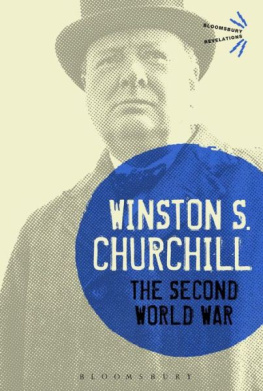MORE PRAISE FOR
THE WORLD AFTER THE WAR
Leebaert offers what for many readers will be a challenging thesis: that in 1945, the United States was hesitant about taking on the mantle of Leader of the Free World, which it later embraced; moreover, in 1945, Great Britain retained the substance and profile of that anachronistic description, a superpower. Only in 1956, after the Suez Crisis, did the US emerge as the Lone Ranger of the planet. Unfortunately, it was not always terribly successful in this guise, as the author argues in this impressively researched book.
Kathleen Burk, author ofThe Lion and the Eagle: The Interaction of the British and American Empires 17831972
A nation in decline that persists in imagining itself indispensable is a menace to itself and to others. So it was with Great Britain after World War II. So too it is with the United States today. With sparkling prose and deft characterizations, Derek Leebaert examines the relationship between those two countriesthe one on the way down, the other reaching its zenithin the first decade of the postwar era. The result is both revealing and immensely instructive. This is historical revisionism of the very best sort.
Andrew J. Bacevich, author ofAmericas War for the Greater Middle East
ALSO BY DEREK LEEBAERT
Magic and Mayhem: The Delusions of American Foreign Policy from Korea to Afghanistan
To Dare and to Conquer: Special Operations and the Destiny of Nations, from Achilles to Al Qaeda
The Fifty-Year Wound: How Americas Cold War Victory Shapes Our World
The Future of the Electronic Marketplace (coauthor/editor)
The Future of Software (coauthor/editor)
Technology 2001: The Future of Computing and Communications (coauthor/editor)
INTRODUCTION
A FREQUENTLY REPEATED TALE ABOUT THE TWENTIETH CENTURY is this: At the end of World War II, the British Empire was too weak and too dispirited to continue as a global imperial power; thus a confidently prosperous, well-armed America assumed leadership of the Westand did so while creating a U.S.-led international order that weve lived with ever since. Today this story is taken for granted. The twentieth century, after all, became the American Century.
But its a myth. Britain, heart of a historic and militarily adroit empire covering a quarter of the worlds land surface, was unlikely to hand on the baton of democracy, liquidate its realms, or retreat from a singular global presenceespecially not in the alleged thousand days after it had played a pivotal role in winning the bloodiest conflict in history.and high tariffs, should suddenly drop its insularity and transform itself into a world political-military force.
In fact, the British Empire hardly wanted out, and the United States did not willy-nilly become a superpower, let alone possess the unique ability to affect the course of events in the developing world, which remained a largely colonial one.
Theres no doubt that at the end of World War II America was by far the worlds strongest nation, with an atomic monopoly and unprecedented industrial weight. But it was still a resolutely distant superstate, hesitant to take up a commanding political and military position. In the dozen years that followed, it faced a shrewd, high-tech, deeply entrenched, Anglo-Saxon colossus whose war-hardened leaders had no intention of stepping aside or of serving as junior partners to anyone. These men continued to assert their power and even their ascendancy until at least the end of 1956, when the just-re-elected administration of Dwight Eisenhower finally avowed a declaration of independence from British influence. It was then that the United States explicitly took over, in the words of its vice president, Richard Nixon, the foreign policy leadership of the free world. Only at that point was Geoffrey Crowther, longtime editor of The Economist, a magazine attentive Americans regarded as the voice of the British establishment, compelled to admit that Britain is no longer a Super-power.
There are few twentieth-century dramas so relevant to the world today. At no time between the aftermath of 1945 and the present have so many aspects of international life been in flux: the rise and retreat of superpowers; shifts in global currency regimes; uncertain mutual defence commitments; and severe doubts among Americans about the value of military primacy in the first place. The roots of todays turmoil spring from this epoch: Europes qualms about U.S. reliability; the destabilization, and redestabilization, of the Middle East; the making of the enduring tragedy of Americas Vietnam War; the countrys justified fears of other long-term entanglements; and fights against terrorists throughout the world. Moreover, an aggressively nationalistic Russia has returned to its crude Soviet-like behaviours while employing its familiar techniques of hybrid war and possession of the planets second-largest nuclear arsenal. Again North Korea and Iran are world issues, and U.S. policy makers continue to speak of how theyll supposedly shape the future of China.
Currently, in Beijing, strategists are devoting intense effort to modelling the fall of empires. They study the fate of the Soviet Union and what caused the hammer and sickle to be hauled down from over the Kremlin on Christmas Day 1991. But theyre also analysing the destiny of the far-flung British Empire, which they presume to have been displaced almost overnight by an American onethe days of which are supposedly numbered as well.
For most of the years between 1945 and 1957, it was difficult to tell how the fate of the British Empire might affect America, except on financial matters. When Eisenhower became president in 1953, he acknowledged not only that Britain was dominant in the Middle East, as it was throughout this era, but also that it wielded a veto over U.S. decisions in Southeast Asia. And this was at a time when top U.S. officials believed that Americas biggest post-war difficultyperhaps more than the Soviet threatwas the inability to say no to the British Empire. In effect, serious people in Washington believed that no acceptable foreign policy was available to the United States if it wasnt aligned with its sprawling, problematic ally. Britain maintained the profile and the substance of a superpower; Eisenhower was, for the time being, candid in his awareness that global military ambitions, along with the attendant political involvements, were alien to the United States.
This book offers a new understanding of the world that arose in the years following World War II. Historys largest empire was battling to maintain its standing, while an utterly novel form of global pre-eminence loomed from across the Atlantic. The outcome shows the changing might of nations, the illusion of trying to mould the destinies of peoples and places unknown, and the risks of attempting to maintain huge political-military edifices on shaky foundations. We see how thoughtful, informed wielders of power reached decisions while feeling besieged, and we find ourselves asking how the United States may segue into some new type of its now-familiar stature in the decade ahead.


